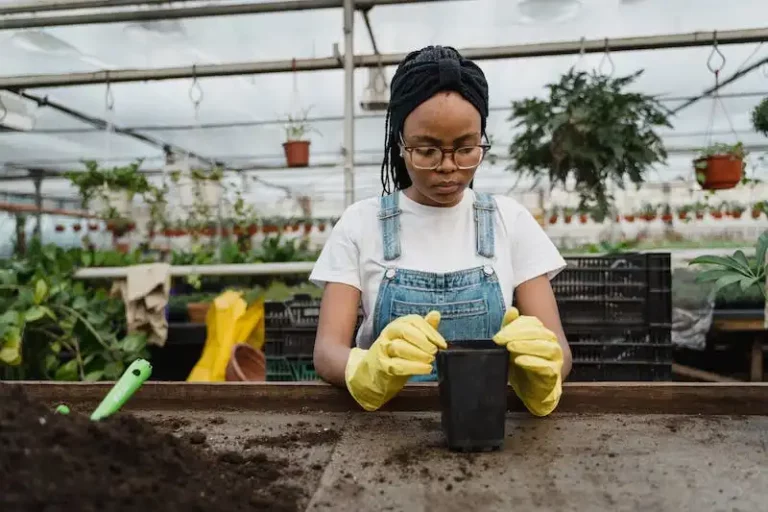Planting herbs has always been a part of gardening wisdom. It has been known for centuries that certain herbs have the ability to repel pests, enhance the growth of other plants, and improve the flavor of vegetables. One example of this is cilantro, which is often grown alongside tomatoes and carrots to attract beneficial insects that help control parasitic pests. The strong scent of cilantro also helps to mask the smell of these vegetables, making them less attractive to pests.
Another herb that is commonly used in companion planting is thyme. Thyme belongs to the Lamiaceae family and is a tall weed-like herb that adds a bright flavor to many culinary sources. It is often planted alongside sage, dill, and other herbs that belong to the same family. These herbs not only bring more flavor to the garden, but they also make great companions for other plants. For instance, the strong scent of thyme is known to deter pests like aphids, while sage is said to attract beneficial insects like braconid wasps and spiders that help control garden pests.
Tarragon is another herb that is often used in companion planting. It is known for its strong scent and is often planted near lettuce, cucumbers, and bay trees. The scent of tarragon is said to help deter pests like aphids and attract beneficial insects like lacewings and ladybugs. This method of planting herbs together to make the most of their natural defenses and attract helpful insects is a great way to create a balanced and thriving garden.
Some herbs, however, are not great companions for all plants. For instance, planting chives near beans and peas can hinder their growth, while planting basil near tomatoes can actually enhance their flavor. There is a wealth of information available on companion planting with herbs, but it is important to note that not all plants will benefit from this method. Some herbs, like parsley and mints, may compete with other plants for nutrients and space, so it is important to do your research before starting a companion planting project.
In conclusion, companion planting with herbs can be a great way to improve your garden’s flavor, deter pests, and attract beneficial insects. However, it is essential to know which herbs work well together and which ones may hinder the growth of other plants. By doing your research and following companion planting guides, you can create a well-balanced garden that not only looks beautiful, but also tastes delicious.
List Of Dill Companion Plants Plants You Should Avoid
When it comes to companion planting, it’s best to choose plants that can support and benefit each other. Dill (Anethum graveolens) is a versatile herb that can be grown alongside a variety of plants. Here is a list of companion plants that can be planted near dill for mutual benefits:
- Mentha spp. (Mint): Mint attracts beneficial insects and deters pests, making it a great companion for dill. However, keep in mind that mint can be invasive, so it’s best to plant it in containers near dill.
- Cilantro (Coriandrum sativum): Cilantro attracts beneficial insects and can help improve dill’s seed germination. Plant dill and cilantro seeds together for an added benefit.
- Tomato (Solanum lycopersicum): Tomatoes and dill make great companions, as dill can help repel tomato hornworms.
- Carrots (Daucus carota): Dill can help improve the growth and flavor of carrots. Plus, carrots can provide some shade for the fragile dill seedlings.
- Feathery and bright-flowered herbs: Herbs like oregano, verbena, and angelica can provide a beautiful contrast when planted near dill. Plus, their flowers can attract beneficial insects.
- Beans (Phaseolus spp.): Beans and dill have a mutually beneficial relationship. Dill attracts beneficial insects that help with pollination, and beans can provide some shade for dill.
- Cucumbers (Cucumis spp.): Dill and cucumbers are often grown as companion plants. The strong fragrance of dill can help repel cucumber beetles, while cucumbers can provide some support for the tall and fragile dill plants.
- Onions (Allium spp.): Onions and dill make good neighbors, as dill can help repel onion flies.
- Winter squash (Cucurbita spp.): Winter squash and dill can be planted together, as dill can help repel pests like squash bugs.
While dill can have many positive companion plants, there are some crops that should be avoided when planting dill:
- Beets (Beta vulgaris): Dill and beets belong to the same plant family (Apiaceae), and they can cross-pollinate. To prevent this, it’s best to keep them separated.
- Cauliflower (Brassica oleracea var. botrytis): Dill can attract the cabbage white butterfly, which can lay its eggs on cauliflower leaves. This can result in the growth of unwanted cabbage worms.
- Stocks (Matthiola incana): Stocks and dill don’t make good companions, as stocks can inhibit the growth of dill.
It’s always a good idea to consult additional guides or sources of information to help you select the best companion plants for your garden. Keep in mind that some plants have specific needs and preferences, so it’s important to do your research before planting them near dill. Companion planting can make a big difference in the health and growth of your herbs and crops, so choose wisely and reap the benefits.
The Best Dill Companion Plants
When it comes to companion planting, dill is a fantastic herb to include in your garden. Not only does it add a lovely fragrance and flavor to your dishes, but it also has the ability to attract beneficial insects and repel unwanted pests. If you’re planning to plant dill, here are some of the best companion plants to consider:
1. Tomatoes: Dill and tomatoes make a great duo in the garden. The pungent smell of dill helps to ward off tomato hornworms, which are a common pest for tomato plants. Additionally, dill attracts beneficial insects like wasps and spiders that feed on other harmful pests.
2. Cucumbers: Dill is a natural companion for cucumbers. Planted near cucumbers, dill can help improve their growth and flavor. It also acts as a deterrent for aphids and spider mites, which are common pests for cucumbers.
3. Onions: Dill and onions belong to the same family, called Allium. Planting them together not only enhances the flavors of both plants but also helps to keep pests like aphids and spider mites at bay. Dill can also attract beneficial insects that feed on onion pests.
4. Lettuce and Salad Greens: Dill is a lovely addition to any salad garden. Its feathery leaves and delicate flowers add an attractive touch to your salad plantings. Plus, the fragrance of dill can help deter certain insects that harm lettuce and salad greens.
5. Herbs: Dill makes a great companion for various herbs. Planting dill near herbs like sage, tarragon, and oregano can help repel pests like spider mites and aphids. Additionally, dill can attract beneficial insects that prey on herb pests.
Whether you are planting dill for its culinary uses or to attract beneficial insects to your garden, considering its companion plants can greatly enhance its performance. So start companion planting with dill and enjoy a healthy and productive garden.
Cucumbers
When it comes to companion planting with cucumbers, there are several herbs that can help repel pests and improve the growth of your crops. One herb that looks beautiful planted alongside cucumbers is the Artemisia family, which includes herbs like tarragon, sage, and marjoram. These herbs not only enhance the flavor of cucumbers in dishes such as pickling and casseroles, but their strong scent can also deter pests.
Another herb from the Artemisia family that can be beneficial when planted with cucumbers is Artemisia absinthium, commonly known as wormwood. This powerful herb has a scent that repels pests, especially spider mites, which are a common problem for cucumbers.
In addition to the Artemisia family, there are other herbs that can be great companions for cucumbers. For example, planting basil near cucumbers can improve their growth and flavor. Basil releases a strong scent that can deter pests, particularly aphids and whiteflies.
Cucumbers also benefit from being planted near members of the Allium family, such as chives and garlic. These herbs can repel insects that are known to damage cucumber plants. Furthermore, chives and garlic release sulfur compounds into the soil that can improve the growth of cucumbers.
If you’re looking to improve the pollination of your cucumber plants, consider planting flowers like marigolds and sunflowers nearby. These flowers attract pollinators, such as bees and butterflies, which can help increase cucumber yields.
When planting cucumbers, it’s important to be careful about the companions you choose. For example, avoid planting cucumbers near members of the Brassicaceae family, such as cabbage and Brussels sprouts, as they can inhibit the growth of cucumbers. Additionally, it’s best to keep cucumbers away from nightshade plants, including tomatoes and peppers, as these plants are susceptible to similar pests and diseases.
Companion planting with herbs can be a beneficial method to improve the growth and health of your cucumber plants. By choosing the right companions, you can repel pests, improve pollination, and enhance the flavor of your cucumbers. So, when planning your cucumber plantings, consider the wisdom of companion planting and the benefits it can bring.
| Potential Companion Herbs | Potential Benefits |
|---|---|
| Artemisia (tarragon, sage, marjoram) | Enhance flavor, repel pests |
| Basil | Improve growth, deter aphids and whiteflies |
| Chives and Garlic | Repel insects, improve growth |
| Marigolds and Sunflowers | Attract pollinators for better yields |
Source: Adapted from “Companion Planting With Herbs” by Old World Garden Farms
Asparagus Plants
Asparagus plants, known scientifically as Asparagus officinalis, belong to the genus Asparagus and are native to the eastern Mediterranean and western Asia. They have been cultivated for thousands of years and are enjoyed for their delicious flavor and many nutritional benefits.
When it comes to companion planting with herbs, asparagus plants have a few good companions that can help improve their growth and repel unwanted pests. Some of the best companion plants for asparagus include:
- Tomato: Tomatoes can provide shade and help retain moisture in the soil, benefiting the asparagus plants. In return, asparagus can help deter tomato pests such as nematodes.
- Parsley (Petroselinum crispum): Parsley is a great companion for asparagus as it can enhance the flavor of the spears when cooked together. Plus, parsley attracts beneficial insects like butterflies.
- Oregano (Origanum vulgare): Oregano is a hardy herb that can help deter pests and diseases that may affect asparagus plants. Its pungent aroma can help repel insects and parasites.
- Thyme (Thymus vulgaris): Thyme is another herb that can provide additional flavoring to asparagus dishes. It also has antimicrobial properties that can help protect the asparagus plants from diseases.
- Lavender (Lavandula): Lavender is not only a beautiful addition to the garden, but it also repels pests that may harm asparagus plants. Its aromatic flowers attract beneficial insects like bees.
It’s important to note that asparagus plants should avoid being planted near certain vegetables and herbs. Some of the worst companions for asparagus include:
- Cilantro (Coriandrum sativum): Cilantro can negatively affect the germination of asparagus seeds and hinder their growth.
- Chervil (Anthriscus cerefolium): Chervil is a parasitic herb that can harm asparagus plants and compete for resources.
- Tarragon (Artemisia dracunculus): Tarragon can inhibit the growth of asparagus and should be avoided as a companion.
- Marjoram (Origanum majorana): Marjoram can have negative effects on asparagus seedlings, so it’s best to keep them separate.
Overall, companion planting with herbs can be a great way to improve the growth and health of asparagus plants. Proper plant combinations can deter pests, improve flavor, and provide additional benefits. Consider these suggestions when planning your herb and vegetable gardens for a successful harvest.




